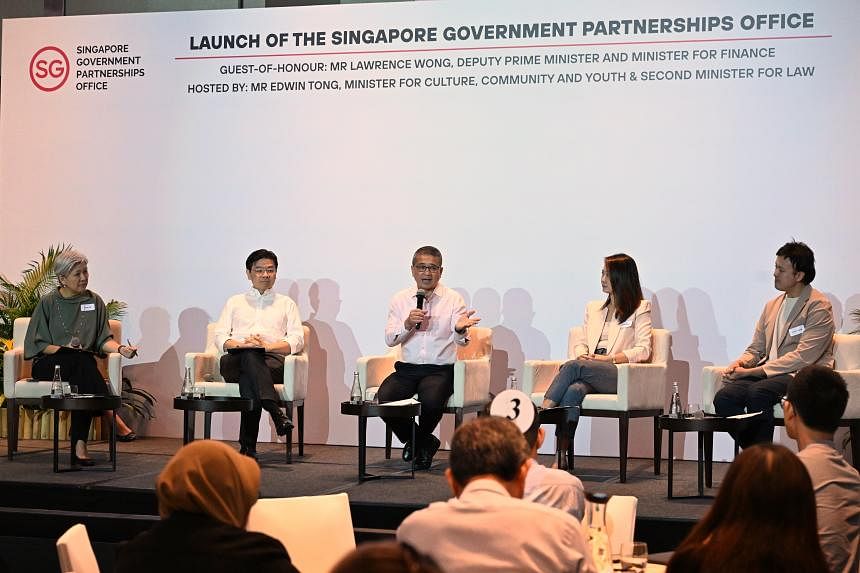SINGAPORE - New laws to protect Singaporeans from online harms and a Housing Board playground designed in collaboration with residents are recent examples of partnerships between citizens and the Government.
Minister for Culture, Community and Youth Edwin Tong said on Jan 19 that such partnerships have always been part of the Government’s DNA, adding: “We might think it’s easy for someone to just draft up some legislation, but the thought process behind it, the rationale and why we do certain things came about because of this partnership.”
Mr Tong was speaking during a dialogue at the launch of the Singapore Government Partnerships Office (SGPO), which will serve as a “first stop” for those keen to partner the Government, and will connect them with resources to help turn their ideas into action.
He highlighted two laws passed in the past two years: the Online Safety (Miscellaneous Amendments) Act, under which social media platforms can be ordered to remove certain types of egregious content like posts advocating self-harm and child sexual abuse; and the Online Criminal Harms Act, which allows the Government to act more effectively against criminal online activities such as scams.
These laws, as well as the formation of charity organisation SG Her Empowerment, which runs Singapore’s first support centre for victims of online harms, came about because a group of people including social workers and lawyers came together to find ways to tackle the scourge of online harm.
Mr Tong added that Singapore is one of the first few countries in the world to have laws to tackle online harms, and that came about because of the power of social activism.
Deputy Prime Minister Lawrence Wong, who was also on the dialogue panel, said Singapore has come a long way in terms of Government-citizen partnership, adding that when he started working in government more than 25 years ago as a young civil servant, there was a very different way of working.
“It was top-down policy,” he said, adding that engagements and consultations with the public were quite rare in those days. And then, these started to become “more mainstream”.
In 2011, when he entered politics, DPM Wong said his starting point was to engage different people and hear their ideas and feedback.
He added: “There will be differences, there will be different perspectives, but hopefully we can form a consensus and hopefully your inputs, your perspectives, will enhance decision making. And often, very many times, they do.”
He cited the example of a playground in Sembawang, which HDB designed and built in partnership with residents under its Build-a-Playground initiative.
About 1,800 people, including residents and other members of the community such as students from nearby schools, came together to share views on the kind of playground they wanted. About 300 residents took part in workshops to design the playground.
He said the sense of fulfilment and ownership residents found through the process was much more than if it had been built through a usual consultation exercise. He opened the playground in 2018 when he was the National Development Minister.
And this experience showed that “there’s a lot that we can do in taking partnerships forward”, he said.
The other two panellists were Mr Larry Yeung, executive director of Participate in Design, a citizen engagement consultancy, and Dr Carol Soon, principal research fellow at the Institute of Policy Studies.
Mr Yeung said one challenge of engaging Singaporeans is that people see engagement as a wish list to ask for what they want. If they do not get what they want, they may dismiss the effort to hear their views.
He told The Straits Times that true engagement is more focused on the process of the Government working with people to find solutions, and less focused on outcomes. So there is a need to help Singaporeans understand how engagement works, he said.
DPM Wong said there is also a need to broaden and deepen partnerships and engagements with Singaporeans in the days ahead.
On the Government’s part, Mr Tong noted, a mindset shift is needed. For example, an idea that was suggested may not work today, but this does not mean it will never work. He suggested that the Government tweak the idea or put it aside until society is ready for its implementation, instead of rejecting it outright.
Ms Lin Shiyun, founder of 3Pumpkins, shared how she started the charity at one presentation during the SGPO launch.
Ms Lin, a former arts producer, started one of the charity’s programmes, the Tak Takut Kids Club, after spending three years at playgrounds interacting with children from low-income families.
“I feel the kids want a sense of belonging. Some of them don’t have good relationships at home,” she said, adding that meeting this need for belonging could help these children break from negative influences they may experience at home.
In 2019, she started the club in a shop in Boon Lay, which offers arts-based and other activities where the children could also make friends.
She said: “With the formation of SGPO, we are looking at how to deepen partnerships and to build a better safety net for the kids.”


